
Marrakech: The Jewel of Morocco
Marrakech, often referred to as the Red City due to its stunning red sandstone buildings, is a captivating blend of history, culture, and modernity. Nestled at the foothills of the Atlas Mountains, this ancient city offers a sensory overload with its vibrant souks, aromatic spices, and bustling streets. The heart of the city, Jemaa el-Fnaa, is a lively square filled with street performers, food stalls, and traditional musicians, making it a must-visit for any traveler seeking an authentic Moroccan experience. Wander through the labyrinthine alleys of the Medina, a UNESCO World Heritage site, where you can discover hidden gems such as the Bahia Palace, showcasing exquisite Moroccan architecture, and the Saadian Tombs, a testament to the city’s rich history. The Majorelle Garden, with its stunning cobalt blue buildings and exotic plants, offers a tranquil escape from the city's hustle and bustle. Marrakech is not just about its historic sites; it is also a hub for contemporary art and design. The Yves Saint Laurent Museum and the Museum of African Contemporary Art Al Maaden (MACAAL) are perfect examples of the city's modern artistic flair. After a day of exploring, indulge in traditional Moroccan cuisine at one of the many rooftop terraces offering panoramic views of the city and the Atlas Mountains beyond.
Local tips in Marrakech
- Visit Jemaa el-Fnaa in the evening for the most vibrant atmosphere.
- Wear comfortable shoes as the Medina's streets are uneven and narrow.
- Try haggling in the souks; it's expected and part of the experience.
- Stay in a riad for an authentic Moroccan lodging experience.
- Carry cash, as many small shops and stalls do not accept credit cards.
- Respect local customs by dressing modestly, especially when visiting religious sites.
- Plan a day trip to the nearby Atlas Mountains for hiking and stunning views.
Neighbourhoods in Marrakech
Marrakech: The Jewel of Morocco
Marrakech, often referred to as the Red City due to its stunning red sandstone buildings, is a captivating blend of history, culture, and modernity. Nestled at the foothills of the Atlas Mountains, this ancient city offers a sensory overload with its vibrant souks, aromatic spices, and bustling streets. The heart of the city, Jemaa el-Fnaa, is a lively square filled with street performers, food stalls, and traditional musicians, making it a must-visit for any traveler seeking an authentic Moroccan experience. Wander through the labyrinthine alleys of the Medina, a UNESCO World Heritage site, where you can discover hidden gems such as the Bahia Palace, showcasing exquisite Moroccan architecture, and the Saadian Tombs, a testament to the city’s rich history. The Majorelle Garden, with its stunning cobalt blue buildings and exotic plants, offers a tranquil escape from the city's hustle and bustle. Marrakech is not just about its historic sites; it is also a hub for contemporary art and design. The Yves Saint Laurent Museum and the Museum of African Contemporary Art Al Maaden (MACAAL) are perfect examples of the city's modern artistic flair. After a day of exploring, indulge in traditional Moroccan cuisine at one of the many rooftop terraces offering panoramic views of the city and the Atlas Mountains beyond.
When is the best time to go to Marrakech?
Iconic landmarks you can’t miss
Jardin Majorelle
Explore the enchanting Jardin Majorelle, a botanical paradise in Marrakech featuring stunning blue architecture and a diverse collection of exotic plants.
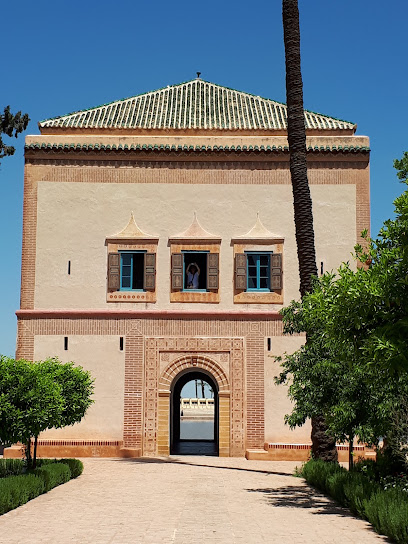
Jemaa el-Fnaa
Discover the vibrant culture and culinary delights of Jemaa el-Fnaa, the iconic heart of Marrakesh and a UNESCO World Heritage Site.
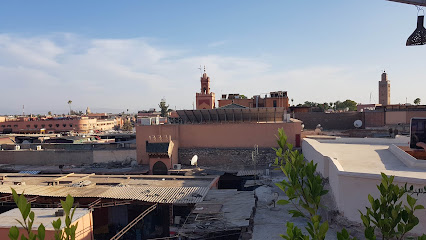
Koutoubia
Discover the architectural wonder of Koutoubia Mosque in Marrakech, a historical landmark that embodies the city's rich cultural heritage.

Bahia Palace
Explore Bahia Palace, a historical gem in Marrakesh, showcasing exquisite Moroccan architecture and rich cultural heritage amidst serene gardens.
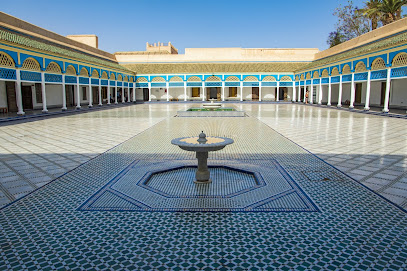
Saadian Tombs
Explore the Saadian Tombs in Marrakesh: A Historical Landmark Showcasing the Opulence of the Saadian Dynasty.
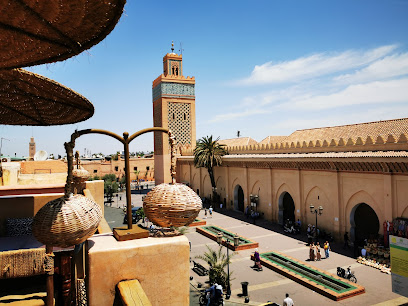
Badi Palace
Explore the majestic Badi Palace in Marrakech, a historical landmark showcasing Moroccan architecture and rich heritage amidst stunning gardens.
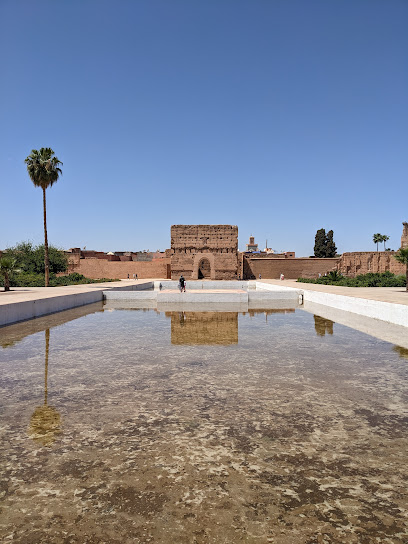
Menara Gardens
Explore the serene Menara Gardens in Marrakesh, a historic park featuring olive groves, stunning views of the Atlas Mountains, and a tranquil atmosphere perfect for relaxation.
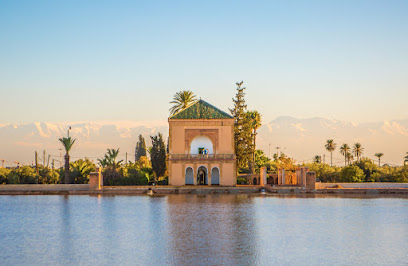
Madrasa Ben Youssef
Experience the architectural brilliance and rich history of Madrasa Ben Youssef, a must-visit historical landmark in Marrakech, Morocco.
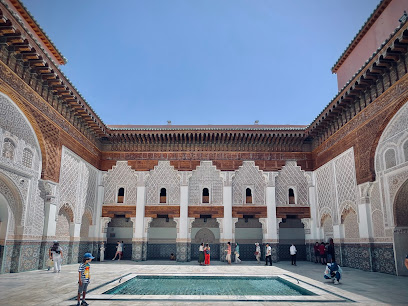
Le Jardin Secret
Explore the serene beauty of Le Jardin Secret in Marrakech, a botanical garden offering lush landscapes, art, and cultural insights in a tranquil setting.
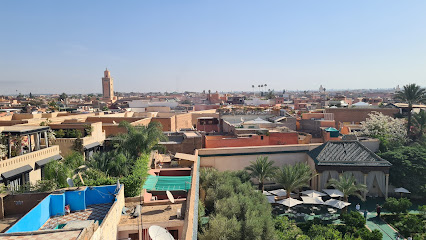
Cyber Park
Discover the serene beauty of Cyber Park in Marrakech, a unique blend of gardens, technology, and history in the heart of the city.
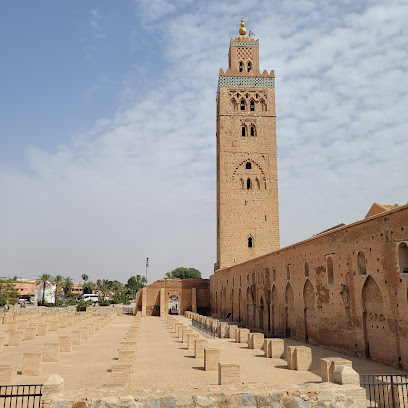
Souk Semmarine
Discover the vibrant Souk Semmarine in Marrakesh – a bustling market brimming with unique crafts, spices, and the essence of Moroccan culture.
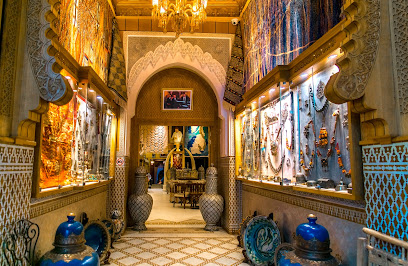
Marrakech Museum
Explore the Marrakech Museum, a treasure trove of Moroccan art and history in the heart of the Medina, showcasing exquisite artifacts and stunning architecture.
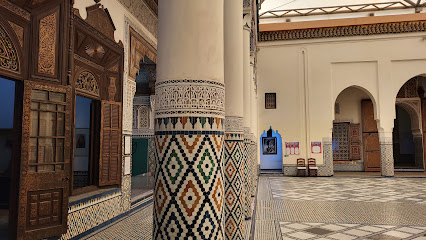
Dar Si Said Museum
Discover the artistic legacy of Morocco at the Dar Si Said Museum, a historical haven showcasing exquisite craftsmanship and culture in the heart of Marrakech.
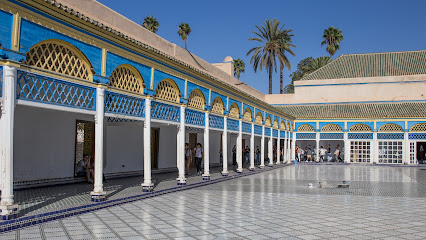
Le MAP Marrakech - Monde des Arts de la Parure
Explore the exquisite world of Moroccan adornments at Le MAP Marrakech, a captivating art museum showcasing rich cultural heritage and stunning craftsmanship.
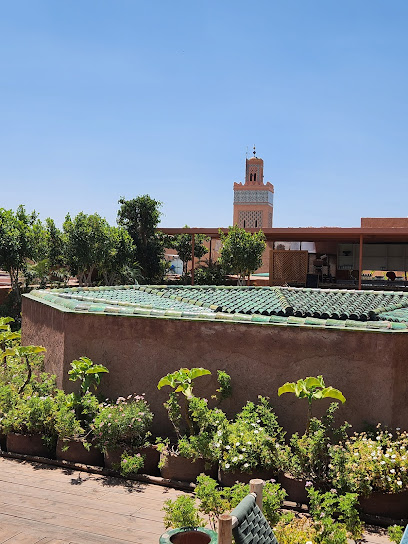
Medina of Marrakesh
Discover the vibrant Medina of Marrakesh, a UNESCO World Heritage site filled with history, culture, and unforgettable experiences.
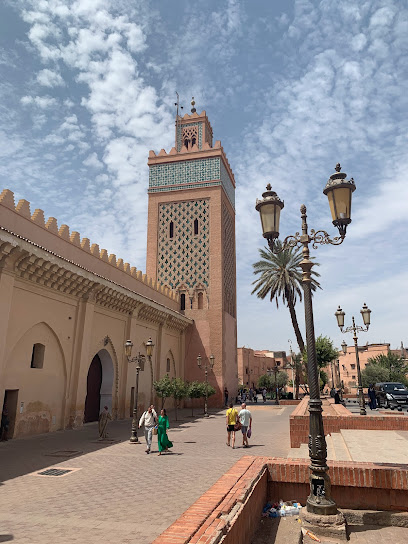
Unmissable attractions to see
Jardin Majorelle
Explore Jardin Majorelle, a botanical paradise in Marrakech filled with vibrant colors, exotic plants, and rich cultural heritage, perfect for a peaceful escape.
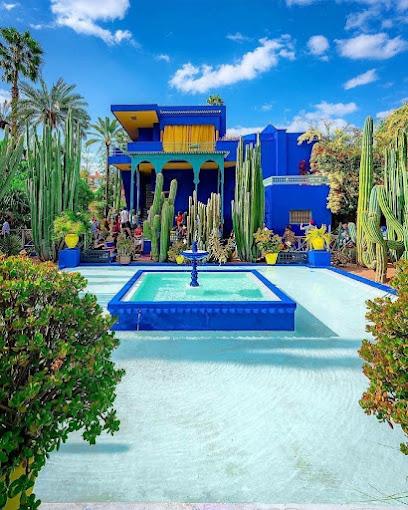
Jemaa el-Fnaa
Discover the enchanting Jemaa el-Fnaa, a cultural landmark in Marrakesh offering a vibrant market and unforgettable experiences for every traveler.
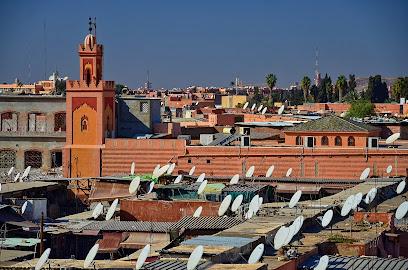
Bahia Palace
Discover the beauty of Bahia Palace in Marrakesh, an exquisite historical landmark showcasing Moroccan architecture and lush gardens.
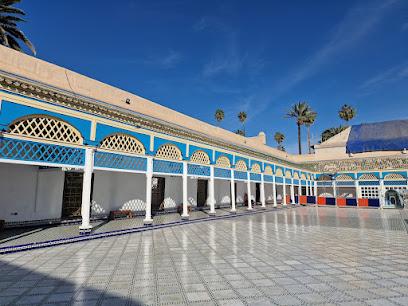
Koutoubia
Explore the iconic Koutoubia Mosque in Marrakech, a stunning symbol of Islamic architecture and a cultural landmark of Morocco.
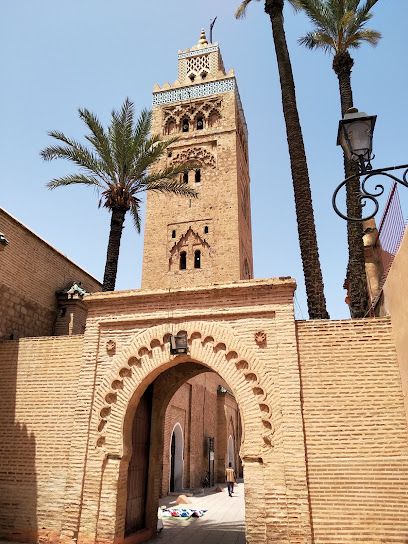
Marrakech train station
Discover the heart of Morocco from Marrakech Train Station, a gateway to stunning adventures and cultural experiences across the enchanting landscapes.
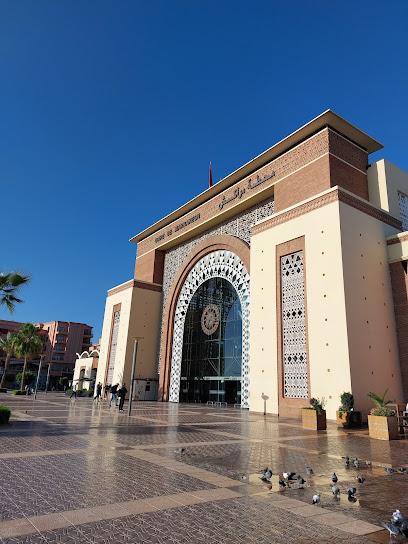
Saadian Tombs
Discover the Saadian Tombs in Marrakesh, an exquisite historical landmark revealing the grandeur of Morocco's royal past through stunning architecture and rich history.
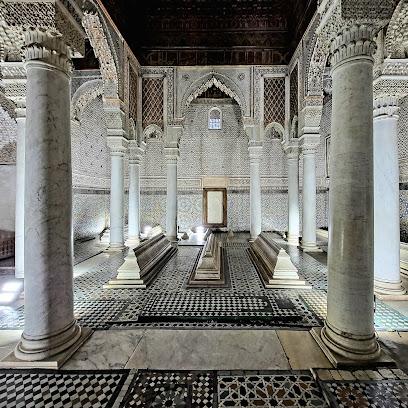
El Badi Palace
Discover El Badi Palace in Marrakech, a historical landmark embodying the splendor of the Saadian dynasty and a must-see for culture enthusiasts.
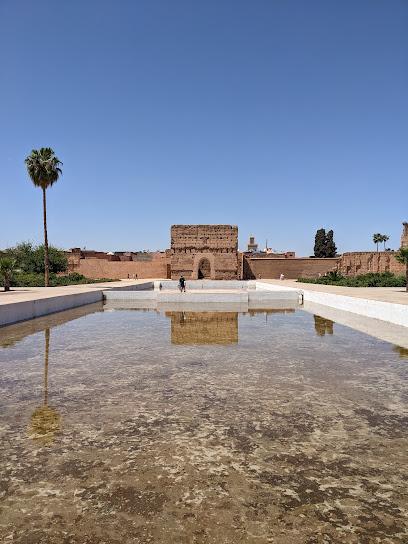
Madrasa Ben Youssef
Explore the architectural wonder of Madrasa Ben Youssef in Marrakech, a historical landmark showcasing exquisite Moroccan artistry and rich educational history.
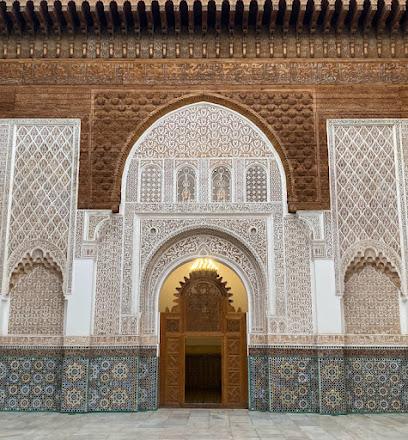
Le Jardin Secret
Explore the enchanting beauty of Le Jardin Secret, a tranquil botanical garden in Marrakesh's Medina, perfect for a peaceful escape amidst the city's vibrant culture.
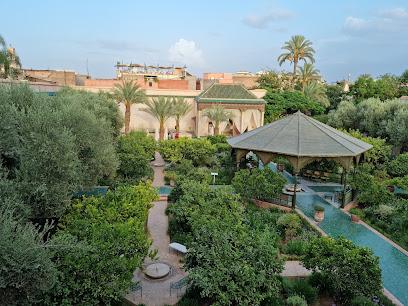
Cyber Park Arsat Moulay Abdesalam
Explore the serene beauty of Cyber Park Arsat Moulay Abdesalam in Marrakech, where history meets modern technology amidst lush gardens.
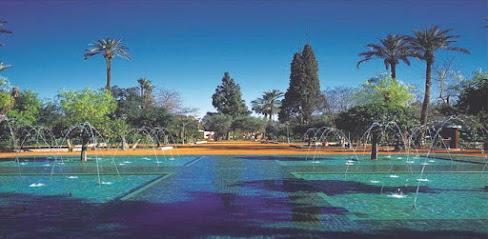
Yves Saint Laurent Museum
Discover the legacy of Yves Saint Laurent at the museum dedicated to his iconic fashion journey in Marrakesh, blending haute couture with Moroccan culture.
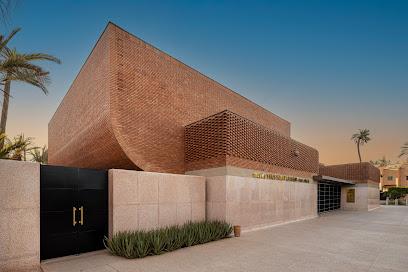
House of Photography in Marrakech
Explore the House of Photography in Marrakech to discover Morocco’s rich visual heritage through captivating historical and contemporary photographs.
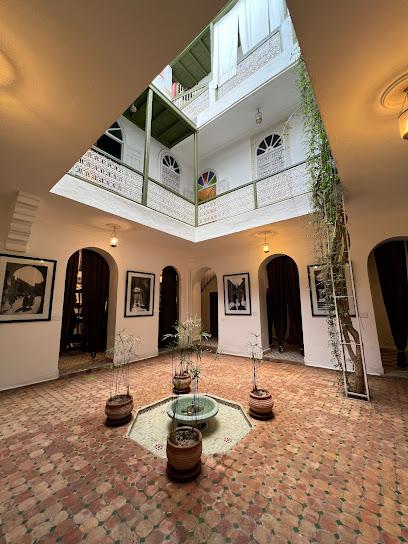
Oukaimeden
Discover the beauty of Oukaimeden, Morocco's premier ski resort, where stunning landscapes meet rich culture and history.
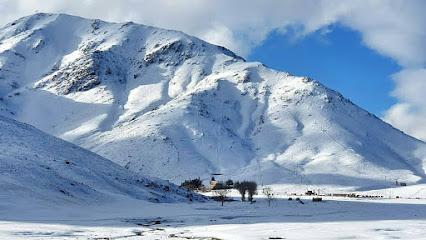
Anima (André Heller Garden)
Explore Anima Garden, a botanical wonder in Marrakech, where art meets nature amid stunning landscapes and vibrant flora.
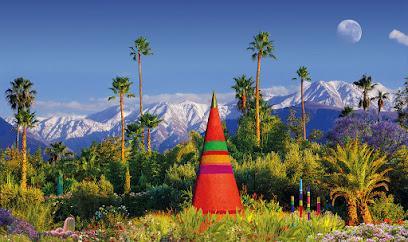
Marrakech Museum
Immerse yourself in the artistic wonders of the Marrakech Museum, where Moroccan culture and creativity come to life.
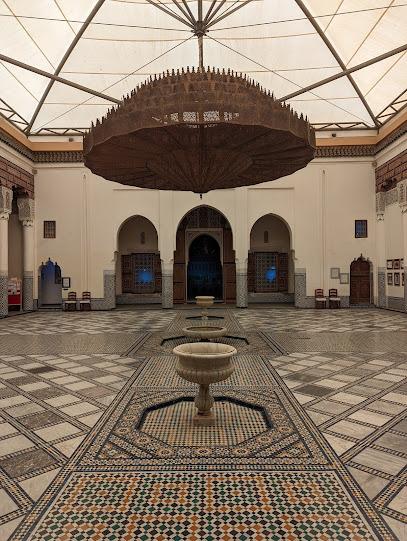
Essential places to dine
Le Bistro Arabe - Moroccan Jazz Restaurant in Marrakech
Discover Le Bistro Arabe: A fine dining haven in Marrakech offering Moroccan cuisine paired with enchanting live jazz performances.
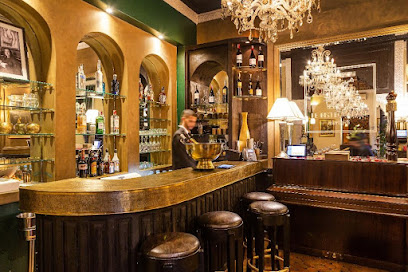
Nomad Marrakech
Discover exquisite Moroccan flavors at Nomad Marrakech - where tradition meets modernity in every dish.
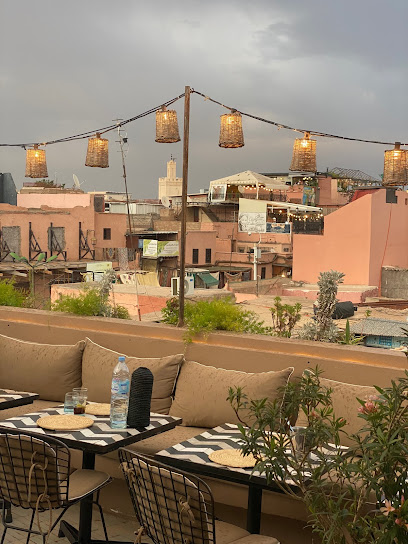
Pepe Nero
Discover the exquisite fusion of Italian and Moroccan cuisine at Pepe Nero in Marrakech's vibrant Medina.
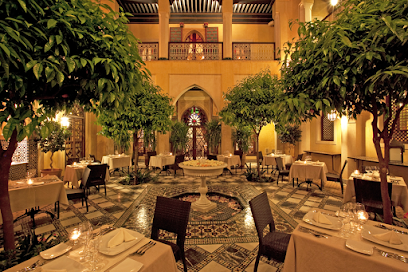
Le Jardin Restaurant Marrakech Medina
Discover authentic Moroccan flavors in a serene garden setting at Le Jardin Restaurant in Marrakech's enchanting Medina.
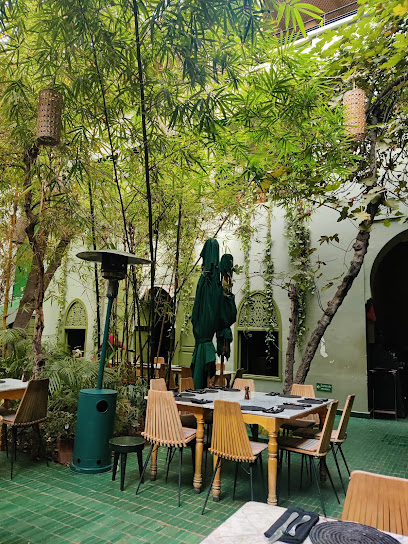
Naranj Libanese
Discover the rich flavors of Lebanon at Naranj Libanese in Marrakesh - where tradition meets modern dining in an enchanting atmosphere.
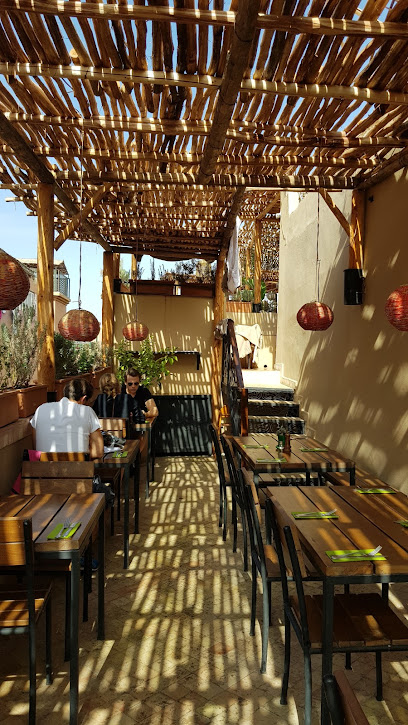
Le terrasse des épices
Discover exquisite Moroccan cuisine and stunning views at Le Terrasse des Épices in Marrakech's Medina.
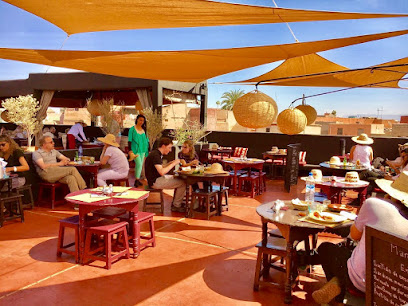
L'Ô à la Bouche
Savor authentic Moroccan cuisine in a charming atmosphere at L'Ô à la Bouche, where tradition meets modern culinary artistry.
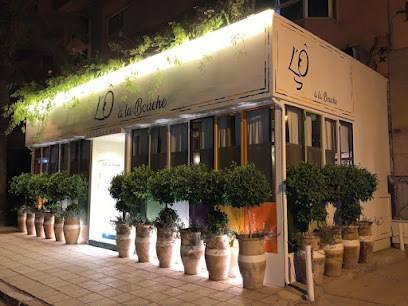
Dar Essalam
Experience the essence of Moroccan cuisine at Dar Essalam – where tradition meets elegance in Marrakech's Medina.
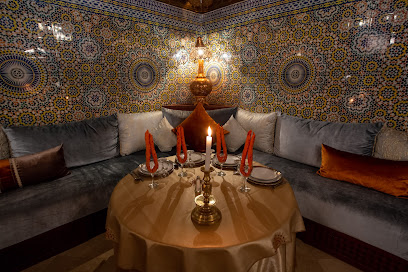
مطعم أزار
Discover the best of Moroccan and Lebanese cuisine at مطعم أزار in Marrakesh - a perfect blend of tradition and modernity awaits you.
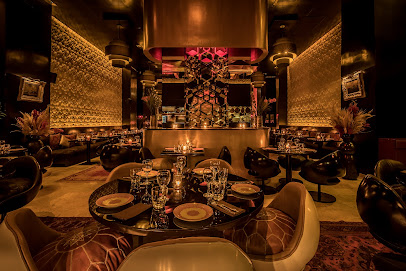
Al Fassia Guéliz
Experience authentic Moroccan cuisine at Al Fassia Guéliz in Marrakech - where tradition and flavor come together.
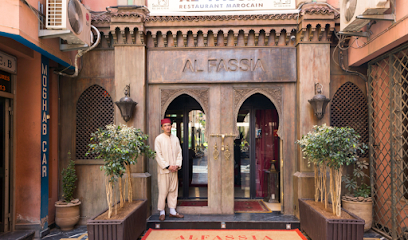
Chez Brahim Restaurant
Experience authentic Moroccan flavors at Chez Brahim Restaurant in Marrakech's vibrant Medina, perfect for families and food enthusiasts alike.
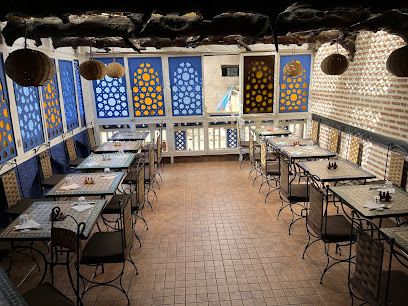
L'mida Marrakech
Experience exquisite Moroccan cuisine at L'mida Marrakech - where tradition meets innovation in every dish.
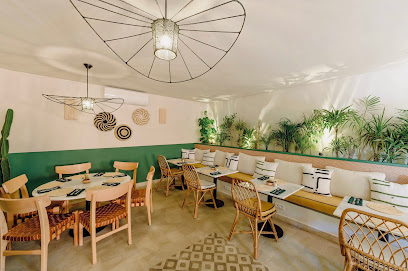
Cuisine De Terroir
Experience authentic Moroccan cuisine at Cuisine De Terroir in the heart of Marrakesh's Medina - a culinary journey you won't forget.
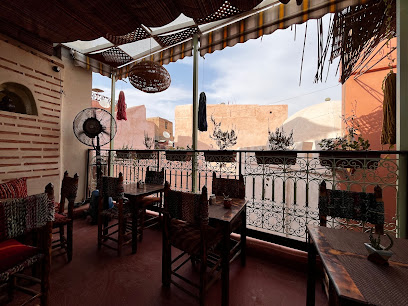
Dar Cherifa
Experience authentic Moroccan cuisine at Dar Cherifa in Marrakech's charming Medina – where tradition meets culinary artistry.
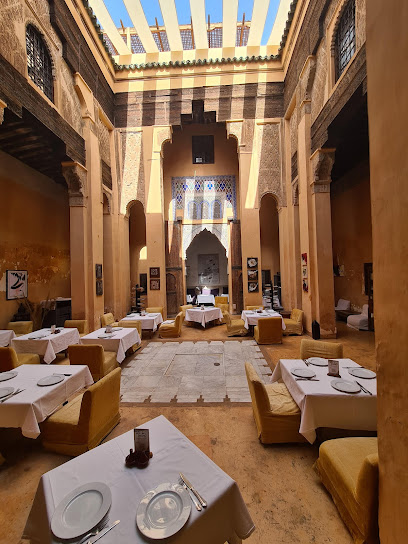
Restaurant Le Grand Bazar Marrakech
Experience authentic Moroccan flavors at Restaurant Le Grand Bazar Marrakech in the heart of Jemaa El Fna.
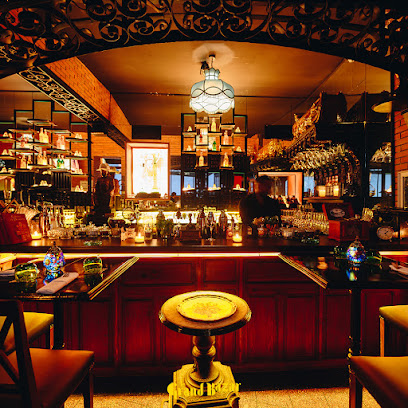
Markets, malls and hidden boutiques
Dar Bouchaib
Discover the essence of Moroccan craftsmanship at Dar Bouchaib, your go-to gift shop in Marrakesh for unique souvenirs, jewelry, and cosmetics.
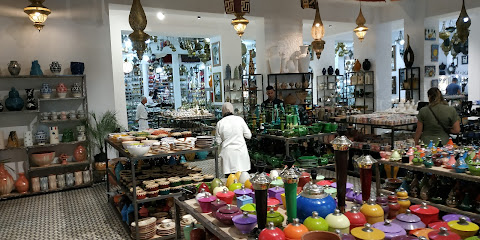
Max & Jan Medina
Explore the vibrant fashion scene at Max & Jan Medina, where unique clothing and accessories meet Moroccan craftsmanship.
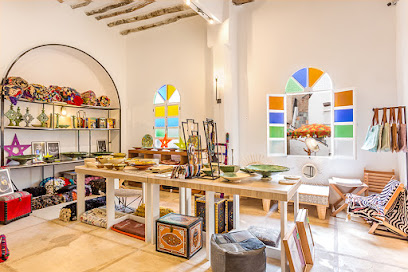
Souk cherifia
Explore Souk Cherifia, the vibrant shopping mall in Marrakesh's Medina, where local crafts and rich culture come together for an unforgettable shopping experience.
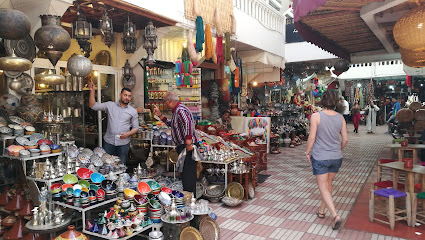
33 RUE MAJORELLE
Discover the vibrant artistry of Marrakech at 33 Rue Majorelle, where unique souvenirs and local craftsmanship await every traveler.
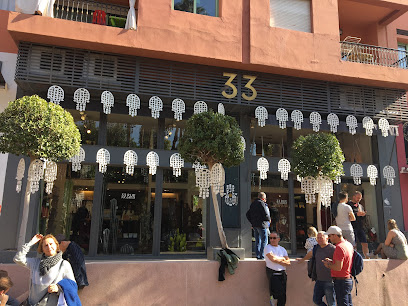
Rebeel_ store.
Discover one-of-a-kind vintage pieces and embrace Moroccan craftsmanship at Rebeel_ Store in the heart of Marrakech's Medina.
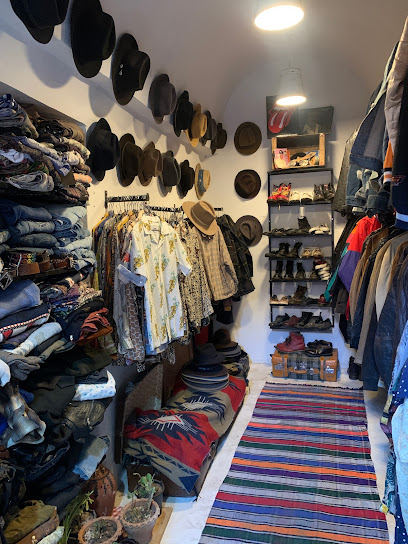
Karim Bouriad Bazar - Moroccan Caftan Marrakech
Explore the exquisite world of Moroccan fashion at Karim Bouriad Bazar, where tradition meets style in vibrant Marrakech.
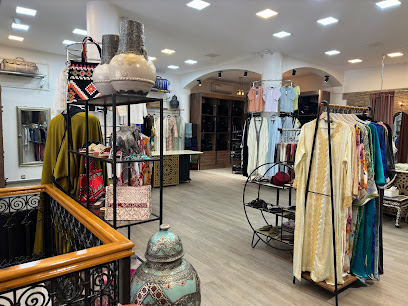
Bazar El Bouanani
Explore Bazar El Bouanani, a delightful gift shop in Marrakech, offering authentic Moroccan souvenirs and a taste of local craftsmanship.
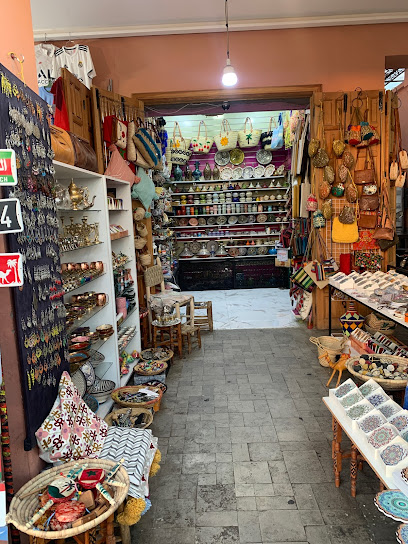
Norya ayroN Shop Marrakech
Explore Norya ayroN Shop in Marrakech for unique vintage clothing and stylish women's apparel in a charming setting that blends tradition with modern fashion.
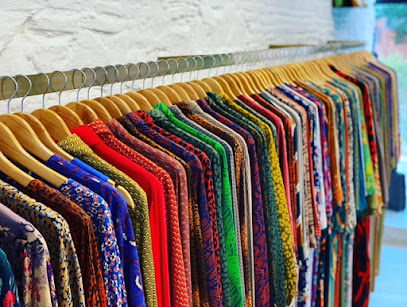
Caftan Shop | Ayas Marrakech
Explore the beauty of Moroccan caftans at Ayas Marrakech, where tradition meets elegance in a unique shopping experience.
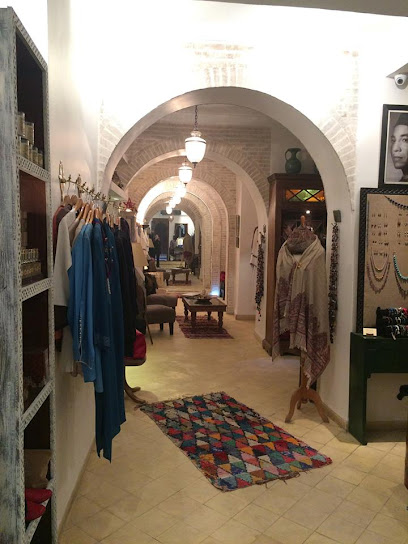
District 26 boutique Marrakech
Explore District 26 Boutique in Marrakech for unique gifts and trendy clothing inspired by Moroccan culture and craftsmanship.
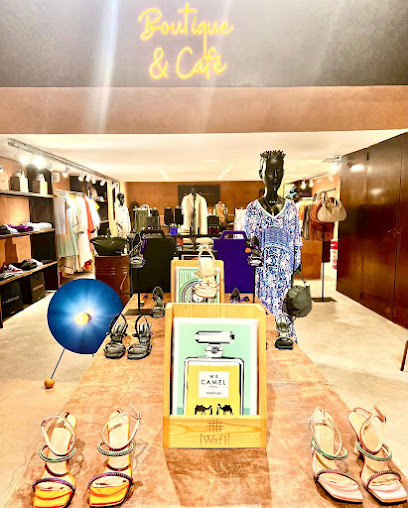
Zen Kesh
Explore the vibrant artistry of Zen Kesh, a unique gift shop in Marrakesh's Medina, offering handcrafted ceramics and authentic Moroccan decor.
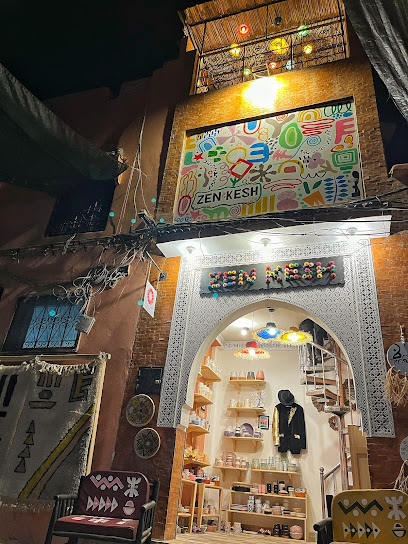
Boutique Majorelle
Discover the essence of Moroccan craftsmanship at Boutique Majorelle, a hidden gem in Marrakesh offering unique handmade treasures.
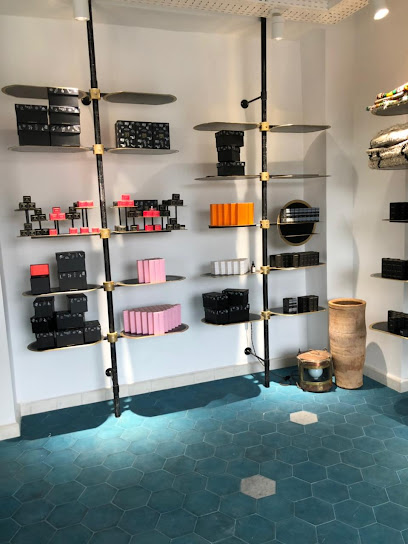
boutique la vannerie
Explore Boutique La Vannerie in Marrakech - your destination for exquisite Moroccan handicrafts and unique home decor items.
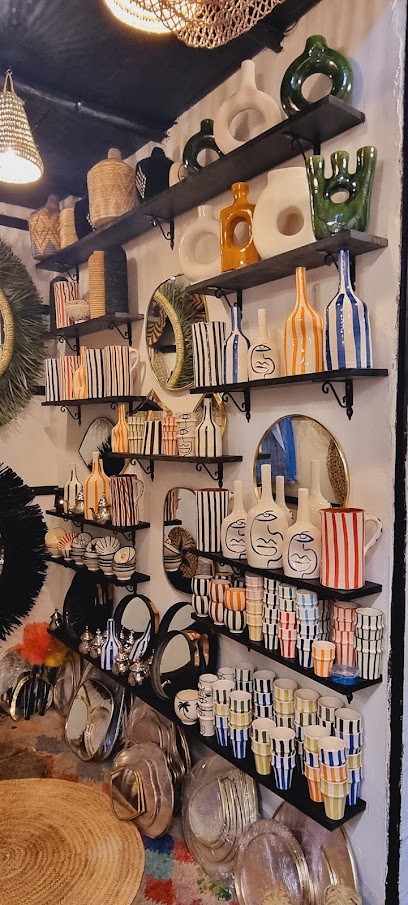
Haj Mbarek Store
Explore authentic Moroccan crafts at Haj Mbarek Store, a charming gift shop in the heart of Marrakesh's vibrant Medina.
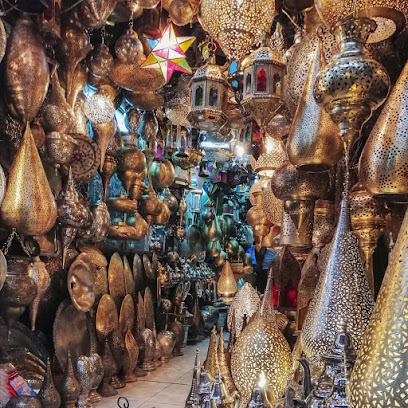
Funky Cool Medina
Explore Funky Cool Medina for unique clothing that captures the vibrant spirit of Marrakesh, blending tradition with modern style.
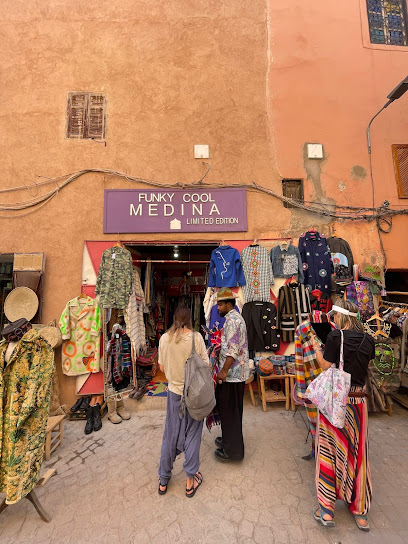
Essential bars & hidden hideouts
La Pergola
Discover La Pergola: A lively bar and restaurant in Marrakech offering Moroccan cuisine, cocktails, and live music in a vibrant atmosphere.
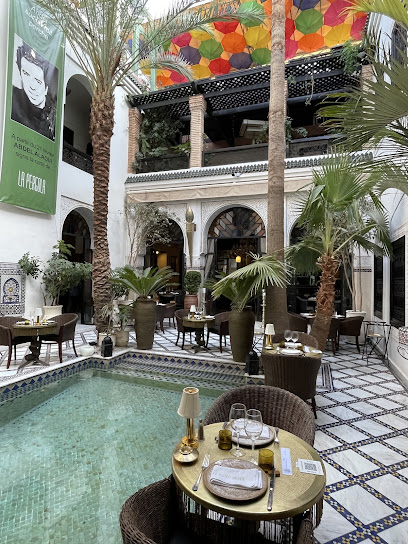
Le Salama Sky-bar
Discover the enchanting Le Salama Sky-bar in Marrakech, where stunning views meet exquisite Moroccan cuisine and a vibrant social atmosphere.
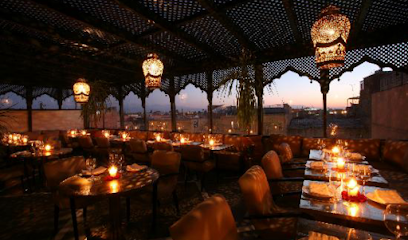
Kosybar Marrakech (Restaurant Bar & Spa)
Experience the vibrant fusion of Moroccan and Japanese cuisine at Kosybar Marrakech, a relaxing lounge and spa in the heart of the city.
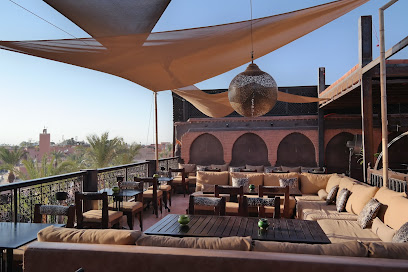
Pointbar Marrakech
Discover the vibrant culinary scene at Pointbar Marrakech, where Moroccan flavors meet modern tapas in a lively atmosphere.
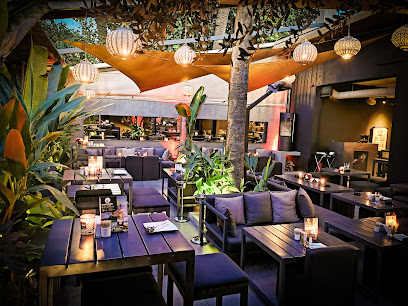
Restaurant - Le 68 Bar à Vin Marrakech
Experience the exquisite charm of French cuisine at Le 68 Bar à Vin, a wine bar in Marrakech offering a cozy atmosphere and exceptional flavors.
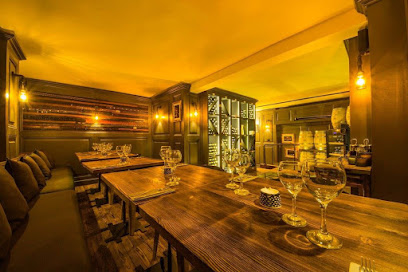
BAROMETRE COCKTAILS in Marrakech
Discover Marrakech's premier cocktail destination, where innovative drinks meet Mediterranean cuisine in a stylish atmosphere.
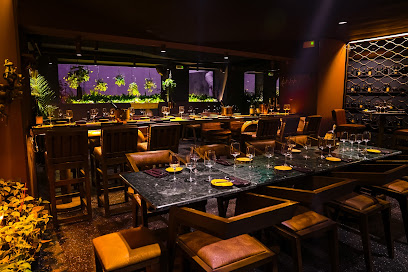
The Lotus Club
Experience the best of French and Mediterranean cuisine in a chic setting at The Lotus Club, Marrakesh's premier dining destination.
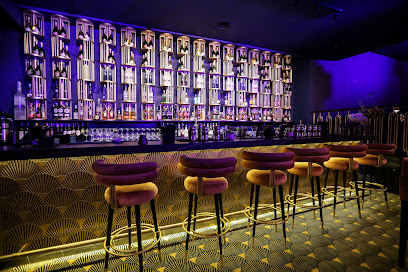
MY Kechmara
Experience the fusion of flavors and vibrant atmosphere at MY Kechmara, Marrakech's premier bar and rooftop restaurant.
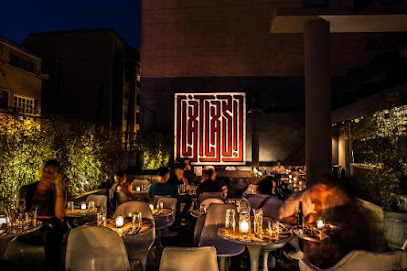
O’Mulligan Resto Pub
Discover O'Mulligan Resto Pub, a lively spot in Marrakech perfect for enjoying local flavors, refreshing drinks, and vibrant entertainment.
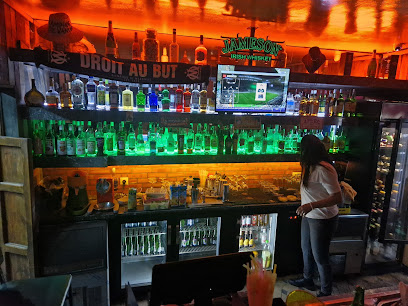
l'envers
Experience the vibrant flavors of Marrakech at L'Envers, where delightful tapas and refreshing drinks await in a charming setting.
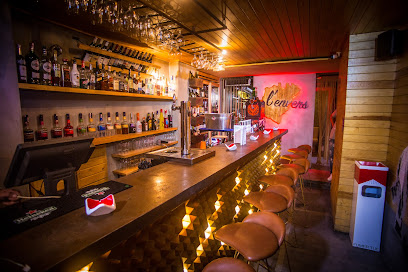
Chesterfield Pub
Discover Chesterfield Pub, a vibrant bar in Marrakech offering a cozy atmosphere, delectable drinks, and a taste of local culture.
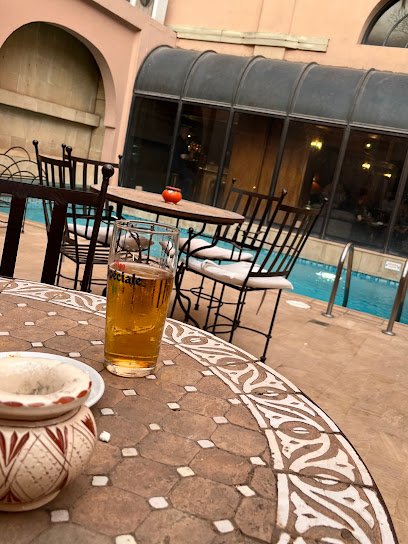
Bar de L'Escale
Discover the vibrant spirit of Marrakesh at Bar de L'Escale, where great drinks and a lively atmosphere await you.
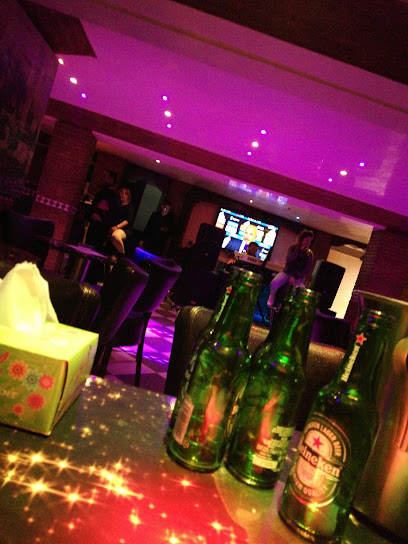
SKY-BAR
Experience Marrakech's nightlife at SKY-BAR, where stunning views and delicious cocktails create unforgettable moments.
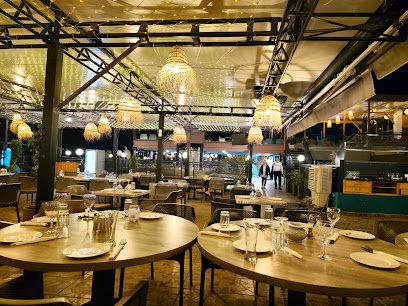
LE MECANO
Experience the vibrant nightlife of Marrakech at LE MECANO, a lively bar known for its eclectic decor, delicious cocktails, and welcoming atmosphere.
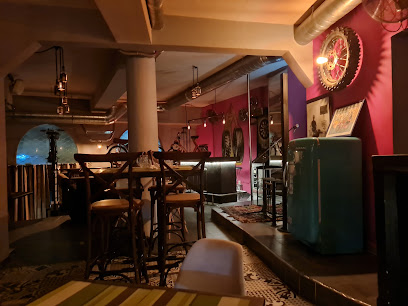
Travel experiences inspired by this city
Explore more travel diariesLocal Phrases
-
- Helloسلام
[salaam] - Goodbyeوداعا
[wadaa'an] - Yesنعم
[naam] - Noلا
[laa] - Please/You're welcomeمن فضلك
[min fadlik] - Thank youشكرا
[shukran] - Excuse me/Sorryعذرا
[aatharana] - How are you?كيف حالك؟
[kayf halak?] - Fine. And you?بخير. وأنت؟
[bikhayr. wa ant?] - Do you speak English?هل تتكلم الإنجليزية؟
[hal tatakallam al'iinjlizia?] - I don't understandلا أفهم
[la afham]
- Helloسلام
-
- I'd like to see the menu, pleaseأريد أن أرى القائمة، من فضلك
[urid 'an 'ara alqa'imat, min fadlik] - I don't eat meatأنا لا آكل لحما
[ana la aakul lahman] - Cheers!في صحتك!
[fi sahtik!] - I would like to pay, pleaseأريد أن أدفع، من فضلك
[urid 'an 'udfi', min fadlik]
- I'd like to see the menu, pleaseأريد أن أرى القائمة، من فضلك
-
- Help!النجدة!
[alnajdah!] - Go away!ارحل!
[irhal!] - Call the Police!اتصل بالشرطة!
[atasl bialshurta!] - Call a doctor!اتصل بالطبيب!
[atasl baltabib!] - I'm lostلقد ضللت
[laqad dalalt] - I'm illأنا مريض
[ana mariid]
- Help!النجدة!
-
- I'd like to buy...أريد أن أشتري...
[urid 'an 'ashtari...] - I'm just lookingأنا فقط أتفرج
[ana faqat atafarraj] - How much is it?كم سعره؟
[kam si'ruh?] - That's too expensiveهذا غالي جدا
[hatha ghaali jiddan] - Can you lower the price?هل يمكنك خفض السعر؟
[hal yumkinuk khifd alsi'ru?]
- I'd like to buy...أريد أن أشتري...
-
- What time is it?كم الساعة؟
[kam alssa'ah?] - It's one o'clockالساعة واحدة
[alssa'ah wahidah] - Half past (10)النصف بعد (10)
[alnisf ba'd (10)] - Morningالصباح
[assaabah] - Afternoonالظهر
[adhuhur] - Eveningالمساء
[almasa'] - Yesterdayأمس
[ams] - Todayاليوم
[alyawm] - Tomorrowغدا
[ghadan] - 1واحد
[wahid] - 2اثنان
[ithnan] - 3ثلاثة
[thalatha] - 4أربعة
[arba'a] - 5خمسة
[khamsah] - 6ستة
[sittah] - 7سبعة
[sab'ah] - 8ثمانية
[thamaniyah] - 9تسعة
[tis'ah] - 10عشرة
[asharah]
- What time is it?كم الساعة؟
-
- Where's a/the...?أين...؟
[ayn...?] - What's the address?ما هو العنوان؟
[ma hu al'ainan?] - Can you show me (on the map)?هل يمكنك أن تريني (على الخريطة)؟
[hal yumkinuk 'an turiini (ealaa alkhariitah)?] - When's the next (bus)?متى القادم (الحافلة)؟
[mata alqadim (alhafilah)?] - A ticket (to ....)تذكرة (إلى ....)
[tadhkarat ('iilaa ....)]
- Where's a/the...?أين...؟
History of Marrakech
-
Marrakech was founded in 1062 by Abu Bakr ibn Umar, a chieftain and cousin of the Almoravid king Yusuf ibn Tashfin. The city quickly grew into a significant political, economic, and cultural center under the Almoravid Dynasty. The red walls of the city and various structures built by the Almoravids, and later the Almohads, gave the city its nickname, the 'Red City'.
-
In 1147, the Almohads, a Berber Muslim dynasty, conquered Marrakech from the Almoravids. They embarked on a campaign to destroy the Almoravid architectural legacy and establish their own. The Almohads constructed the Koutoubia Mosque, which remains one of Marrakech's most iconic landmarks.
-
The Saadian Dynasty brought a golden age to Marrakech in the 16th century. Under Sultan Ahmed al-Mansur, the city flourished as a hub of wealth, culture, and architectural innovation. The Saadian Tombs and the El Badi Palace are enduring legacies of this prosperous period.
-
In 1912, Morocco became a French Protectorate, significantly influencing Marrakech's development. The French established the modern quarter of Gueliz, introducing new architectural styles and urban planning concepts. This period also saw the preservation and restoration of many historical sites.
-
Following Morocco's independence in 1956, Marrakech continued to grow and modernize while preserving its historical heritage. The city has become a major tourist destination, celebrated for its vibrant souks, historic palaces, and gardens. Modern Marrakech seamlessly blends the old with the new, offering a unique cultural experience.
-
In 1985, the medina of Marrakech was designated a UNESCO World Heritage Site. This recognition highlighted the city's rich history, architectural marvels, and cultural significance. The designation has helped to ensure the preservation and promotion of Marrakech's unique heritage.
Marrakech Essentials
-
Marrakech is served by Marrakech Menara Airport (RAK), located about 6 kilometers southwest of the city center. The airport has flights from major cities in Europe, the Middle East, and other parts of Africa. From the airport, you can take a taxi, airport shuttle, or pre-arranged hotel transfer to the city center. Alternatively, you can arrive by train from other Moroccan cities such as Casablanca, Rabat, and Fes, with Marrakech being the southern terminus of the ONCF rail network.
-
Marrakech has a variety of transportation options. Taxis are plentiful and inexpensive; 'petit taxis' are for short trips within the city, while 'grand taxis' are used for longer distances and can be shared. Public buses operated by ALSA are a budget-friendly option, and the city's new tramway system covers key areas. Renting a car is an option, but driving can be challenging due to traffic and narrow streets. For a more authentic experience, consider taking a caleche (horse-drawn carriage) ride around the city.
-
The official currency in Morocco is the Moroccan Dirham (MAD). Credit cards are widely accepted in hotels, restaurants, and larger shops, but it's advisable to carry cash for smaller purchases and in markets. ATMs are abundant in Marrakech, especially in tourist areas like Jemaa el-Fnaa and Gueliz. Currency exchange can be done at banks, exchange offices, and some hotels.
-
Marrakech is generally safe for tourists, but standard precautions are advised. Be cautious in crowded areas like Jemaa el-Fnaa and the souks, as pickpocketing can occur. Avoid walking alone in poorly lit areas at night. Neighborhoods such as Medina can be maze-like and confusing; consider hiring a guide or using a reliable map app. Always keep an eye on your belongings and avoid displaying valuable items.
-
In case of an emergency, dial 19 for police assistance, 15 for medical emergencies, and 15 for fire services. Hospitals and clinics are available in Marrakech, with the Mohamed VI University Hospital being a major facility. Pharmacies are widespread and can provide over-the-counter medications. It is advisable to have travel insurance that covers medical emergencies.
-
Fashion: Do dress modestly, especially in religious and traditional areas. Avoid revealing clothing. Religion: Do respect Islamic customs. During Ramadan, avoid eating, drinking, or smoking in public during daylight hours. Public Transport: Do be courteous and offer your seat to elderly passengers. Don’t eat or drink on public transport. Greetings: Do greet people with a handshake or a slight bow. In traditional settings, it's appropriate to greet with 'Salam Alaikum.' Eating & Drinking: Do try local dishes and accept food offerings graciously. Don’t refuse hospitality, as it's considered impolite.
-
To experience Marrakech like a local, visit the local souks where you can haggle for goods and interact with merchants. Try traditional Moroccan street food such as tagine and pastilla. Spend an evening in Jemaa el-Fnaa to enjoy the lively atmosphere with street performers and food stalls. Take a stroll in the Jardin Majorelle or the Menara Gardens for a peaceful retreat. Engaging with locals can provide deeper insights into the city's culture and traditions.
Nearby Cities to Marrakech
-
Things To Do in Taroudant
-
Things To Do in Essaouira
-
Things To Do in Agadir
-
Things To Do in Casablanca
-
Things To Do in Meknes
-
Things To Do in Fes
-
Things To Do in Asilah
-
Things To Do in Chefchaouen
-
Things To Do in Tangier
-
Things To Do in Tetouan
-
Things To Do in Europa Point
-
Things To Do in Gorham's Cave Complex
-
Things To Do in St. Michael's Cave
-
Things To Do in Alameda Botanic Gardens
-
Things To Do in Queensway Quay Marina




























